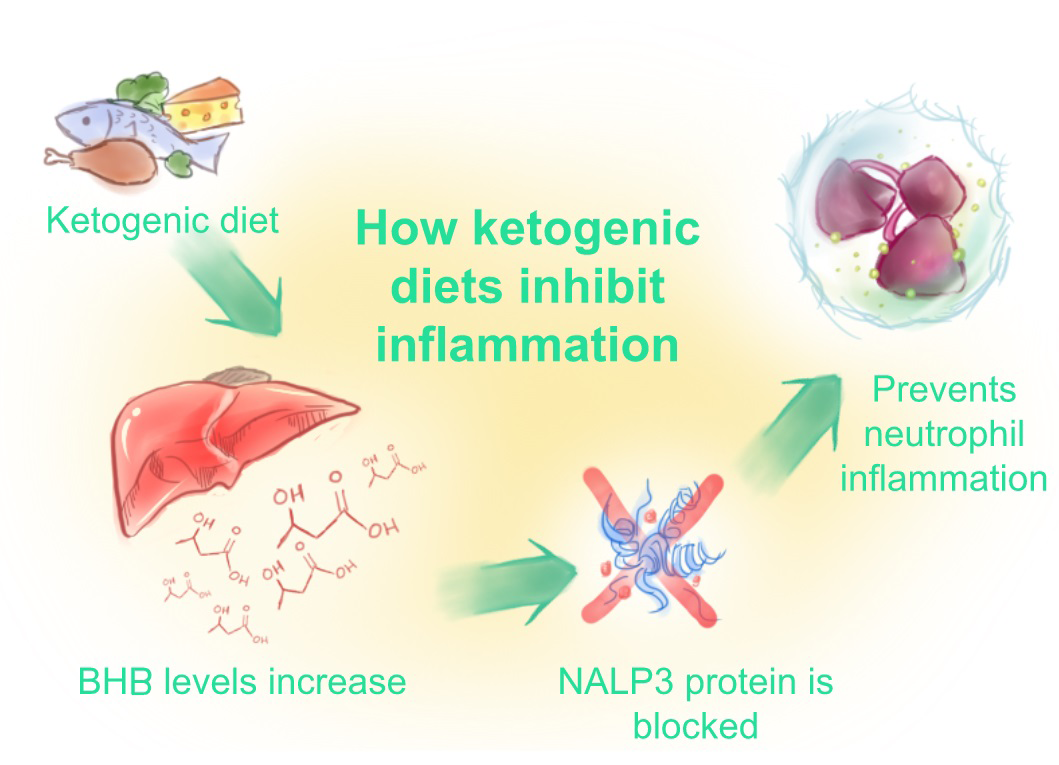In Brief:
- In autoimmune diseases, our body’s immune system can go rogue and cause unnecessary inflammation
- Researchers at Yale School of Medicine discovered that a compound produced by a ketogenic diet can block inflammation in diseases like gout
- This research could lead to new treatment options for patients with inflammatory diseases
People are vulnerable. We get cuts, infections, and diseases that can damage us. However, we aren’t lacking in defenses; our immune system fights off invaders and protects us. Like the military, it deploys its forces to stop threats. As our white blood cells combat enemies, we may experience inflammation and parts of our bodies may redden, swell, and ache. Still, we find comfort in knowing that it is all part of the healing process.
Unfortunately, some people are denied that comfort. When our body’s military is deployed in the absence of invaders, white blood cells desert their duties and cause unnecessary inflammation. Diseases that cause this kind of rogue deployment are known as autoimmune diseases.
Patients who suffer from excess inflammation have limited treatment options. But, in the Dixit Lab at Yale, researchers have made progress towards a remedy. A team led by Dr. Vishwa Deep Dixit, Professor of Comparative Medicine and Immunobiology, has found a possible solution through dieting and fasting.
The Dixit Lab focuses on inflammation and aging, which has led the scientists to study calorie restriction, a practice that can prolong a person’s lifespan. They found that fasting or consuming a ketogenic diet, a low-carbohydrate diet that surprisingly consists of fats, can increase the amount of beta-hydroxybutyrate (BHB) in the body. BHB is a ketone body, a compound produced by the liver, that inhibits inflammation. Ketone bodies like BHB are produced during fasting to serve as an alternative energy source for important organs.
The team recently focused on neutrophils, which are highly inflammatory white blood cells. “[Neutrophils] are the cells that get recruited to the site of injury first,” says Dr. Emily Goldberg, Ph.D., a member of Dr. Dixit’s team. After stimulating these cells in a culture dish with ketone bodies, the researchers found that BHB could prevent neutrophil inflammation by blocking a certain protein.
After this discovery, the researchers applied it to rats with gout, a neutrophil-driven inflammatory disease that causes episodes of acute pain. Currently, the treatment options for gout patients are fairly limited. “There are really poor options for some of their pain management,” explains Dr. Goldberg. “If they don’t respond to the drugs that are available, there’s really nothing we can do for them.”
With the aid of a veterinarian at Yale, the researchers managed to induce gout in rats, which are typically incapable of contracting the disease. Then, they used a ketogenic diet to elevate the rats’ production of BHB. As their previous findings suggested, the rats were protected from inflammation.
This discovery could prove very valuable because the researchers at the Dixit Lab used outbred rats. While inbred rats are a strain of genetically identical rats, outbred rats, like humans, have more variation. Dr. Goldberg added that the success of the ketogenic diet in outbred rats “indicates translational potential,” meaning that it has greater potential for human application.
The lab’s goal is to help patients by providing a simple and accessible treatment for autoimmune diseases that cause unwanted inflammation. Although the current method of diet manipulation could be difficult for people to maintain, the researchers are investigating other ways to increase BHB levels.
The progress made by Dr. Dixit and his team is undeniably important. It’s thanks to these scientists that people suffering from autoimmune diseases have the opportunity for better treatment. Even though some diseases can turn our immune system against us, we can still find other ways to fight back.
SCIENCE STAR
Dr. Emily Goldberg is a postdoctoral fellow at Yale University. She obtained her Ph.D. in the Nikolich-Zugich lab at the University of Arizona. Dr. Goldberg works in the field of immunology. More specifically, her research is focused on aging and metabolism. She started volunteering in labs in high school and kept researching as an undergrad and in grad school. Describing her experiences, she said “I got lucky,” with a laugh, before going on to detail one of the projects she worked on which sparked her interest in her current topic. When she isn’t in the lab, Dr. Goldberg might be found doing pottery or playing ultimate frisbee.
Works Cited
- Interview with Emily Goldberg, conducted by the author, August 2017
- “Activation of the NLRP3 Inflammasome – Review.” InvivoGen. Last modified 2009, http://www.invivogen.com/review-nlrp3-inflammasome
- “What is Inflammation?” WebMD. Accessed July 25, 2017, http://www.webmd.com/arthritis/about-inflammation#1
- Youm, Y.H., Nguyen, K.Y., Grant, R.W., Goldberg, E.L., Bodogai, M., Kim, D., D’Agostine, D., Planavsky, N., Lupfer, C., Kanneganti, T.D., Kang, S., Horvath, T.L., Fahmy, T.M., Crawford, P.A., Biragyn, A., Alnemri, E., Dixit, V.D. (2015) The ketone metabolite β-hydroxybutyrate blocks NLRP3 inflammasome-mediated inflammatory disease. Nat. Med. 21(3):263-9
- Goldberg, E.L., Asher, J.L., Molony, R.D., Shaw, A.C., Zeiss, C.J., Wang, C., Morozova-Roche, L.A., Herzog, R.I., Iwasaki, A., Dixit, V.D. (2017) β-hydroxybutyrate deactivates neutrophil NLRP3 inflammasome to relieve gout flares. Cell Reports Feb 28;18(9):2077-2087
Image Credits:
Feature Image:
- [“Healthy Food” by Anonymous (Edited). License: CC0 1.0]
- [“Fit Belly and Tape Measure” by Petr Kratochvil (Edited). License: CC0 1.0]
Story Image:
By Staff Illustrator – Sreya Das
Chief Editor: Aparna Ragupathi
Creative Team Coordinator: Sreya Das
Team Editor: Akila Saravanan
Team Graphic Designer: Sreya Das
This article was written by Adrienne Yu. As always, before leaving a response to this article please view our Rules of Conduct. Thanks! -cSw Editorial Staff

